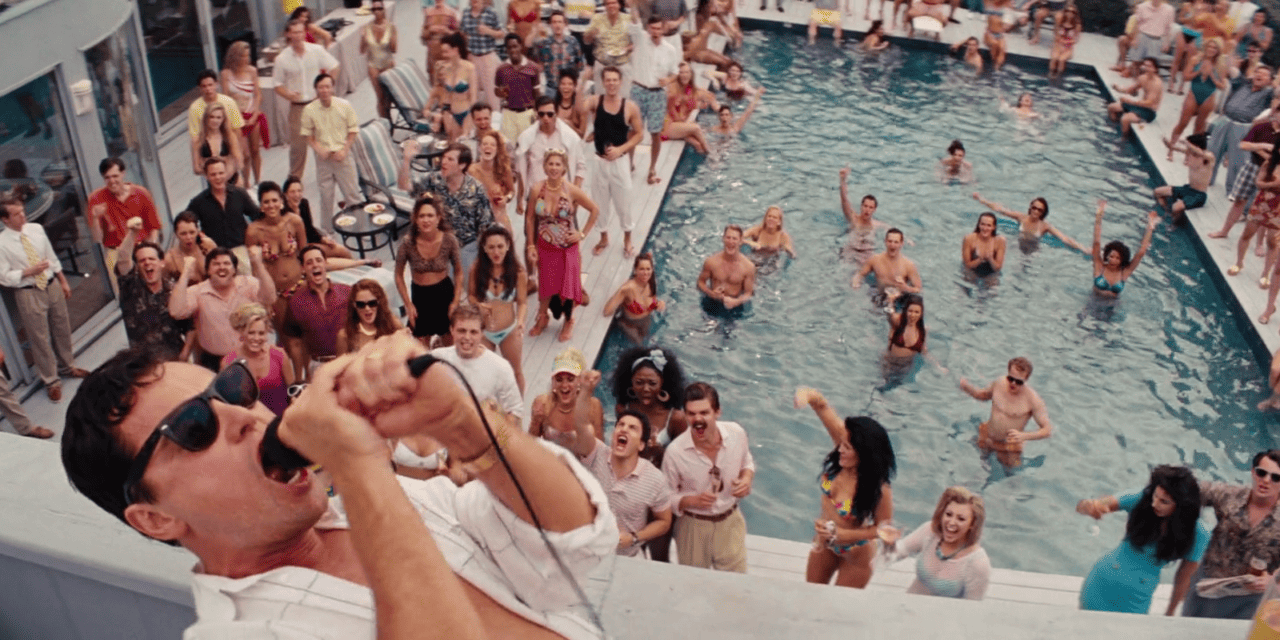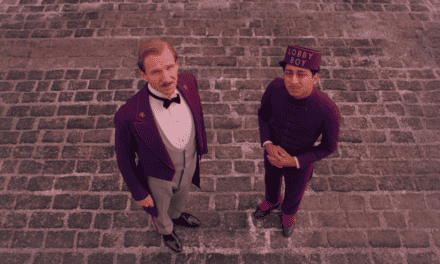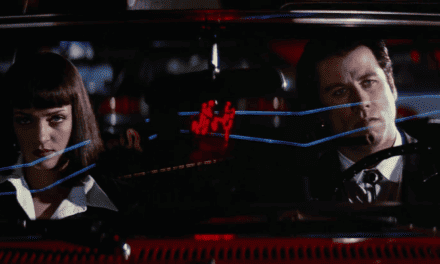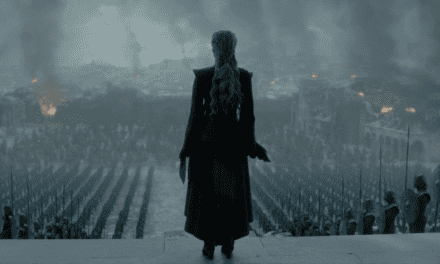MediaPurgatory.com makes money by partnering with advertising networks and displaying ads on its articles. If you purchase anything by clicking on the ads featured in this article, the site’s owner may receive compensation for that purchase.
I have a love-hate relationship with director Martin Scorsese. Back in the day, his collaborations with actors Robert De Niro, Joe Pesci, Frank Vincent, and writer Nicholas Pileggi gave me some of my all-time favorite movies: Goodfellas (1990) and Casino (1995).
But as he started collaborating with Leonardo Dicaprio in the new millennium, his movies’ quality seemed to drop a notch despite all the continued critical acclaim, and nowhere is this perhaps more evident than in his 2013 biopic, The Wolf of Wall Street.
Now, the film was a huge success both critically and commercially, it has a huge following online, and it’s routinely listed as one of the greatest movies of the decade. So, what could be so wrong with The Wolf of Wall Street? Why am I being so harsh about this beloved masterpiece?
Well, quite a few things. So without further ado, let’s get down to business, but also, keep in mind that this review contains spoilers.
Characters | Wolf Of Wall Street vs Boogie Nights
The biggest issue I had with the film was how the characters were written. To illustrate my point, a good movie to compare A Wolf of Wall Street to would be Paul Thomas Anderson’s 1997 masterpiece – Boogie Nights.
Both movies are drenched in drugs, sex, and degeneracy, but while Boogie Nights has excellent writing and complex characters, A Wolf of Wall Street doesn’t seem to offer anything beyond lots of nudity and profanity. Now, let’s compare the character writing so you can see what I mean:
I. Boogie Nights (1997)
- Eddie Adams (Mark Wahlberg) – a teenager who is kicked out of his own house by his controlling mother and has nowhere to go, except to his friends in the adult industry who provide him with a job and a roof over his head. Very soon, he is sucked into the world of drugs and adult entertainment, and, due to his tender age, he is unable to control all the addictions he is exposed to.
- Maggie (Julianne Moore) – an adult actress who is losing the custody battle for her son due to her criminal past and her work in the adult industry. Because of this, she battles with depression and she even channels some of her motherly energy toward her younger male co-stars with whom she films sex scenes, treating them like her sons, in an attempt to fill the void left by her child’s absence.
- Jack Horner (Burt Reynolds) – a pornographer and Maggie’s husband who deludes himself that he is creating high art, that his movies will one day become classics, and that he will be recognized as one of the great filmmakers of his time.
I could go on and on about how even the supporting characters played by Don Cheadle, William H. Macy, Heather Graham, and Philip Seymour Hoffman are extremely well-written, each with their backstory and complexity to match, but, in the interest of saving time, we’ll cut it here.
Now let’s compare these characters with the ones in The Wolf of Wall Street:
II. The Wolf of Wall Street (2013)
- Jordan Belfort (Leonardo DiCaprio) – spends 100% of screen time telling you how rich he is, trying to impress you with how much he spends on prostitutes, cars, and boats, how much drugs he can consume, and most of all, how much he can say f@ck, s#it and all the other swear worlds.
- Donnie Azoff (Jonah Hill) – spends 100% of his screen time trying to impress you with how much drugs he can consume and how much he says f@ck, s#hit and all that jazz.
- Every other character in Stratton Oakmont: – trying to impress you with how much drugs they can consume and how much they can say f@ck, sh#t, co$ksucker, motherf*ucker…
Do you see the problem here?
It seemed as if the characters had absolutely no depth whatsoever, especially compared with Scorcese’s earlier epics like Raging Bull, Goodfellas, or Casino. Maybe if Scorsese showed us their human side and let us see them going through some hard times, it would make them more relatable, but NO!
It was all just 3 hours of “look at how rich we are, how recklessly we are spending our money, how much illegal substances we can consume, and most of all, how much we can say ‘f@ck.’ Aren’t we interesting?”
Fun fact: Leonardo DiCaprio was the original choice to play Eddie Addams (the lead character in Boogie Nights), but he had to decline because he had already signed to film Titanic (1997). He later stated that he regretted not being able to do both movies. It was also Dicaprio who recommended Mark Wahlberg for the lead role in Boogie Nights.
Profanity
Now, don’t get me wrong! Some of my favorite movies (Scarface, Goodfellas, Casino) used tons of profanity, however, in those cases, the characters came from a poor Italian/Cuban background; they have spent their entire childhood doing petty crimes and hanging out with the older gangsters, and, in most cases, they lacked even elementary education. So the profanity came naturally and it never felt out of place.
But in Wolf of Wall Street, watching a bunch of rich, spoiled, high school and college-educated dudes with a middle-class background saying “f@ck” all the time was like watching Vanilla Ice trying to prove how “ghetto” he is to everybody. It was just 3 hours of guys thinking and acting like they were tough, all because they had mastered the hyper-masculine job of… dialing phones.
Predictability
When it comes to Scorcese’s filmography, predictability is not something unique to The Wolf of Wall Street. There was also a certain dose of predictability with Scorsese previous epics like Goodfellas and Casino. In both of these movies, it’s obvious that the gangsters are not going to have a happy ending, but, even then, the movie kept you guessing how it would all go down – who would turn into an informer, who’s getting “whacked,” who’s going to jail for the rest of his life, etc.
But with The Wolf of Wall Street, there are numerous instances where Jordan Belfort (Leonardo DiCaprio) breaks the fourth wall and begins to explain to the audience what they are currently doing in Stratton Oakmont and ending with some version of “which is not necessarily legal, but we’ll be richer than s#it, so f#ck it.”
This leaves very little room for speculation as to how it’s all going to end. You just know that it’s only a matter of time before the FBI agents have a field day with all the material they’ve gathered and arrest everybody (which they did).
The predictability was not only an issue with the ending but with individual scenes as well. For example, in the airplane scene where Jordan Belfort awakes from sleep, finds out he’s tied to a chair, and, due to the drugs he’s been taking, he cannot remember how he got himself in that situation. Donnie informs him that he had to be restricted due to his behavior and we can see that a flashback is coming.
Immediately I thought: “Let me guess: He dry-humped a stewardess or something?” And, lo and behold, he did dry-hump a stewardess! Considering Belford and all the other male characters at Stratton Oakmont have absolutely nothing going for them character-wise, except acting like a bunch of unhinged 16-year-olds, what else could he have done?
The Wolf of Wall Street and “Toxic Masculinity”
But not everyone had nice things to say about The Wolf of Wall Street. Right after its release, Jordan Belfort (as portrayed by Leonardo DiCaprio) and his colleagues became the poster boys for, what some people now refer to as, “toxic masculinity.” It’s unclear to me why this term exists, and why we must now invent new terms and re-label everything, especially when the appropriate words already exist.
For example, there is nothing masculine (toxic or otherwise) about the male characters working at Stratton Oakmont. Whether it’s Leonardo DiCaprio yelling at a microphone or throwing money at the FBI Agents after finding out they cannot be bribed, or Jonah Hill eating a goldfish and urinating on legal documents, the perfect words to describe this kind of behavior are “childish” and “immature.” There is nothing masculine about thirty-somethings acting like they never left puberty.
And then, during the last part of the movie, when Belford’s masculinity is actually being put to the test for the first time, he agrees to wear a wire and rats all his friends to the FBI. He also gets physical with his wife and resorts to doing drugs when he finds out that Naomi is leaving him and she’s taking the kids with her. What a manly man!
If you want to see what true masculinity looks like in a film, I recommend you watch Kurt Russel in Escape From New York (1981), Russell Crowe in Gladiator (2000), or Viggo Mortensen in Eastern Promises (2007).
Jordan Belfort as a role model
If you work in sales today, particularly cold calling (like yours truly, at the time of this writing), chances are you’ll find quite a few people who idolize Mr.Belfort and want to become the next Wolf of Wall Street themselves. This was an unintended consequence of the film, but, for this one, we cannot blame either Scorsese or Terence Winter (the screenwriter).
The movie clearly shows that it does not glorify Jonathan Belford and his actions. But, just like some people started worshiping Tyler Durden after watching Fight Club (and, by doing so, completely missed the point of the movie), many people today who are getting into sales and cold calling are having Mr.Belfort as an idol after seeing The Wolf of Wall Street.
All these people have completely forgotten that the only reason Jordan was able to acquire all that wealth is because he also broke the law more times than he is capable of remembering. Now, was Jordan Belfort a good salesman? Probably yes. But he wouldn’t have been able to make nearly as much money if he did everything legally.
The true role models for people who get into sales should be the ones who make their living by playing by the rules. Jordan Belfort was a cautionary tale; not a hero.
In Conclusion
If you haven’t seen Raging Bull, Goodfellas, Casino, or any of the other Scorsese masterpieces of the previous century, you might be forgiven for thinking that Wolf of Wall Street is a great movie. But if you have seen those films and know what this director is capable of, you might conclude that this film cannot stand shoulder-to-shoulder with his old material.
Wolf of Wall Street borrows heavily from movies like Scarface (1983) and Bogie Nights (1997) but is ultimately inferior to both, especially when it comes to the quality of the writing. This, however, is not Scorsese’s fault, but Terence Winter’s (the screenwriter), as Scorsese shared no writing credits.
Now, does that mean that everything about this movie is a miss?
Of course not.
The scene where the ludes finally “kick in” with Belford having to drive himself home and stop Donnie from talking on the phone was a work of genius, especially when it comes to the acting. The conflict between Donnie Azoff and Brad Bonick (and his Slavic wife) was another highlight.
All in all, The Wolf of Wall Street is just an OK movie, but nothing more. It relies too heavily on profanity and naked women as a selling point, and it doesn’t bother much with good writing. The male characters were one-trick-ponies with “look how much we spend on cars, prostitutes, and how much we swear” type of behavior, and the female ones were there mostly to just look good naked, but there was very little substance “underneath the hood.”
It’s an OK movie that you can watch with your friends on a Saturday night with some beer and popcorn, but it doesn’t deserve the “classic” label.
Anyway, thanks for reading the article, and If you are a fan of the movie, I hope you didn’t take anything personally. So have a great day, relax, and get yourself some quaaludes (just kidding, of course).






Recent Comments